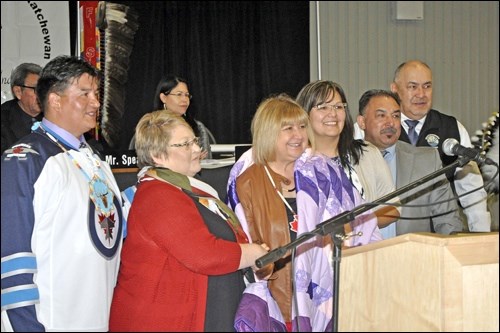Federal money is heading to aboriginal communities to go towards indigenous employment and training organizations across Canada.
Federal minister of Employment and Social Development MaryAnn Mihychuk announced the support at the Federation of Saskatchewan Indian Nations spring legislative assembly in North Battleford Wednesday.
The funding commitments for 2016 amount to $100 million this year and include the following:
A total value of $50 million is set aside for the Skills and Partnership Fund, which encourages indigenous organizations to create partnerships with governments, businesses and community organizations to improve skills training.
There is a new call for proposals for that fund and a deadline is set of July 5 to get those in.
As well, there is additional support set to come in this year for ASETS — the Aboriginal Skills and Employment Training Strategy. A three per cent increase in funding which takes effect immediately and that amounts to $9 million.
Mihychuk told reporters this will be bridge funding that will last until next year when the ASETS agreement is set up. Mihychuk also said this is the first increase in funding for ASETS since 1999.
"There will be more money for you this year, right now," said Mihychuk to those in the Northland Power Curling Centre.
In speaking to reporters, Mihychuk said the ASETS funding would be based on population, but she also noted there were "certain communities that are in crisis, and for those we're going to find a way to put even more money."
The minister also is looking for ideas on how to improve ASETS and make it more functional. In her remarks before the assembly, Mihychuk pointed to the red tape involved in filling out ASETS application forms.
She called the process time consuming and full of barriers for applicants. "I want to apologize on behalf of Canada, because it's very painful," Mihychuk said.
In addition, there will also be funding going to indigenous employment and training. These particular investments are designed to help aboriginal people overcome barriers to employment.
This will go towards supports for such things as GED and other training for youth at risk, flexible child care, funding to help someone relocate to employment including housing, bus passes and social services, and covering the cost of getting government ID, and driver education and licensing among others.
The changes are in response to the recommendations from the truth and reconciliation report, which the Justin Trudeau government has committed to adopting in full. It is also a response to the high unemployment on reserves and particularly in northern communities, with Mihychuk saying the government is playing catch up.
"Governments after governments, particularly the federal governments, have let you down," said Mihychuk to the assembly.
"When you have a dropout rate from school of 60 per cent, it's unacceptable. When young people see no hope and opportunity, it's shameful."
In speaking to reporters following the announcement, FSIN chief Bobby Cameron welcomed the funding announcement.
"It's an investment for many of our communities that have been really requesting that for many, many years," said Cameron.
"It's an investment because now we have that opportunity to build that foundation to create jobs, and these jobs are going to be filled by our own First Nation people. It's about investing in our people in our back yard here in Saskatchewan."
But Cameron acknowledged some of those living in northern communities may have to move to take advantage of opportunities.
"There's limited jobs in the north, we all know that," said Cameron, who said the goal was "to fill all the jobs to capacity in the north, and of course we encourage our Grade 12 graduates and other able-bodied First Nations people, they have to leave the northern communities to seek employment and secure employment in other regions of Saskatchewan."
The announcement by the federal minister was one highlight of the first day of the spring assembly, which was to go for two days in North Battleford on May 25 and 26. Participating were representatives from First Nations across Saskatchewan.
Several resolutions were up for discussion over the course of the two days, with one resolution producing the other big news of the first day.
Up for debate was a proposed name change of the organization from "Federation of Saskatchewan Indian Nations" to "Federation of Sovereign Indigenous Nations".
That name change resolution was ultimately carried during the Wednesday session.
The schedule for Thursday morning included appearances by national Chief Perry Bellegarde of the Assembly of First Nations (also a former FSIN chief), as well as by federal minister of public safety Ralph Goodale.



